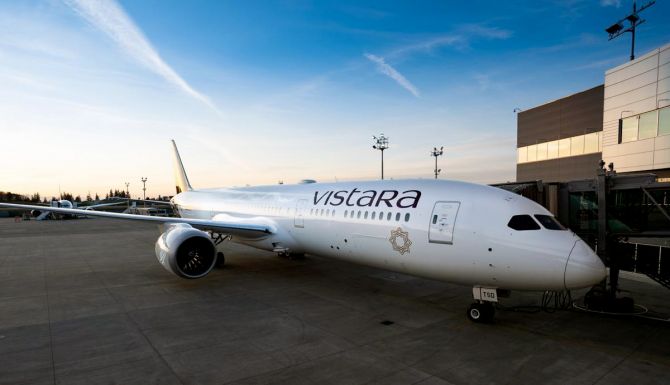Market estimates suggest the airline has already totted up Rs 1,800 crore of losses in FY20, and FY21 is expected to see losses in the region of Rs 2,500 crore to Rs 3,000 crore
Many in the sector say that Vistara lacks the light-footedness of the airlines with which it competes, reports Anjuli Bhargava.

In early March 2020, Vistara inducted its first B787-9 -- the Dreamliner -- to launch its international operations, almost five years after it took to the skies, a much-anticipated moment for the Tata-Singapore Airlines joint venture in India.
But as luck would have it, the aircraft arrived to stand on the ground for several months as the pandemic grounded airlines worldwide.
For close to six months, the aircraft lay idle and was joined by a second one in August, in consonance with the induction schedule.
It is, however, only at the end of August that Vistara decided to launch its maiden international Delhi-London (Heathrow) flight, three times a week as of now.
In terms of timing, the induction couldn't have come at a worse moment.
This is as far as the carrier's international operations go. But even its domestic fleet -- grounded like those of other airlines -- has been lying virtually idle through the pandemic.
"The airline has been slow and stodgy in its management in this time of crisis," says an aviation industry analyst. Many in the sector say that Vistara lacks the light-footedness of the airlines with which it competes.
Airlines such as SpiceJet took the lead in pushing revenues through cargo and charter operations during the pandemic, a move followed quickly by the market leader IndiGo. Vistara, by contrast, has only recently started focusing on both these revenue-earning streams.
In an e-mail response the company said it was taking a deeper dive into cargo and charter operations, increasing its revenue through cargo and doing more charters.
"During the lockdown, Vistara operated 34 special cargo flights in a little over a month's time to transport more than 220 tonnes of essential commercial goods, relief material, and medical supplies," a spokesperson said.
The airline said it had pulled its Dreamliner into cargo operations, too. The spokesperson added that the airline had also done a few international charters -- without specifying how many -- and would now be doing some flights under the travel bubble.
The airline currently operates around 50 domestic flights a day, compared with close to 125 flights for SpiceJet and 500-odd for IndiGo.
Ever since flights resumed, many carriers are taking bookings for flights to collect cash but cancelling them at the last minute due to very poor loads.
The carriers find themselves in a "chicken and egg" situation. Carriers need to fly more and win back passenger confidence. But loads are very low and don't justify operations, so carriers are for loads to pick up to add more flights.
"Only if they fly more will loads pick up," argues an official in the Directorate General of Civil Aviation. A bloodbath on their books is unavoidable for now, he says.
"The danger of Vistara going the 'Kingfisher way', a money guzzler with no hope of returns, is the big worry," says an industry source.
The pandemic and the consequent hit on airlines coupled with Vistara's almost tortoise-like approach is pointing towards far higher losses in FY21.
According to CAPA India Research, Vistara's losses for FY20 are Rs 1,270 crore (Rs 12.70 billion) and will cross Rs 1,800 crore (Rs 18 billion) in FY21 (being unlisted Vistara does not reveal its financials).
But industry sources say CAPA's numbers are conservative.
Market estimates suggest the airline has already totted up Rs 1,800 crore of losses in FY20, and FY21 is expected to see losses in the region of Rs 2,500 crore to Rs 3,000 crore (Rs 25 billion to Rs 30 billion), because the first quarter is a write-off and the post-pandemic recovery of the sector is unclear.
Domestic losses, they argue, will be compounded by the international ones for this year.
Many are confounded by the sheer size of the airline's losses in FY20. Almost all the Indian players gained substantially in the first quarter of the year gone by due to Jet's closure and it is argued that one of the biggest gainer from Jet's closure in some sense should have been Vistara as it was the only one offering a business class product on the main trunk routes, just as Jet did.
While IndiGo ended the year (despite a far bigger operation) with a loss of Rs 230 crore (Rs 2.3 billion) and SpiceJet (53 aircraft) with a loss of almost Rs 930 crore (Rs 9.3 billion), Vistara's loss at Rs 1,800 crore with 33 aircraft in operation has taken the industry by surprise.
"It's hard to see how, when and where the airline anticipates this changing," says one source. The airline in response defended the losses, arguing that it invested in aircraft and expansion and that oil prices remained high through the year.
But more fundamental questions remain up in the air, such as whether the Indian domestic aviation space can at all support a full-service airline.
Many believe -- based on the experience with both Jet and Kingfisher -- that the Indian market can no longer support a full-service carrier.
In a recent interview, IndiGo CEO Rono Dutta argued that he didn't think there was any space in India's market today for an airline to charge a bit more for this or that. Vistara sources also acknowledge that its "premium economy" gambit tried in its initial days did not work and now the Indian market's price sensitivity cannot support any extras.
Industry veteran Shakti Lumba adds that "the very fundamentals on which Vistara was set up have been uprooted by COVID-19". In a post-COVID-19 world, he thinks, the airline's chances of success are slim.
Many believe that the Tata group made a cardinal mistake in 2019 when it failed to buy the struggling Jet Airways and merge it into Vistara.
Now some feel that the only way for the Tatas to make good of this investment is to buy Air India and try to pull off a successful merger of two "public sector companies", the latter a telling comment on how Vistara is viewed in India's aviation landscape.











